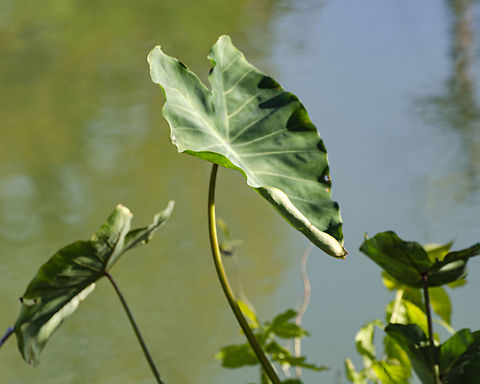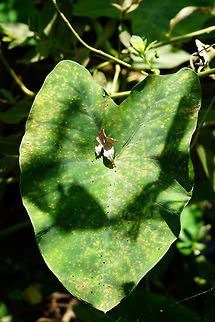
Appearance
Rhizomes of different shapes and sizes. Leaves up to 40×24.8 cm, sprouts from rhizome, dark green above and light green beneath, triangular-ovate, sub-rounded and mucronate at apex, tip of the basal lobes rounded or sub-rounded. Petiole 0.8 -1.2 m high. Spathe up to 25 cm long. Spadix about 3/5 as long as the spathe, flowering parts up to 8 mm in diameter. Female portion at the fertile ovaries intermixed with sterile white ones. Neuters above the females, rhomboid or irregular oblong. Male portion above the neuter. Synandrium lobed, cells 6 or 8. Appendage shorter than the male portion.
Naming
This plant and its root is generally called taro, but it has different names in different countries like for instance eddoe. In the Philippines, it is usually called Gabi, Abi or Avi.Distribution
Taro was probably first native to the lowland wetlands of Malaysia . Estimates are that taro was in cultivation in wet tropical India before 5000 BC, presumably coming from Malaysia, and from India further transported westward to ancient Egypt, where it was described by Greek and Roman historians as an important crop. In India, it is known as "Gaderi", with smaller ones called "arbi" or "arvi" being more common and popular. In Indonesia, it is called ''talas'' or ''keladi''.In Australia, ''Colocasia esculenta'' var. ''aquatilis'' is native to the Kimberley region of Western Australia; variety ''esculenta'' is naturalised in Western Australia, the Northern Territory, Queensland and New South Wales.
In Turkey, ''Colocasia esculenta'' is locally known as "''gölevez''" and mainly grown on the Mediterranean coast, such as the Alanya district of Antalya.
In the southeastern USA, this plant is recognized as an invasive species.
Habitat
Taro was probably first native to the lowland wetlands of Malaysia . Estimates are that taro was in cultivation in wet tropical India before 5000 BC, presumably coming from Malaysia, and from India further transported westward to ancient Egypt, where it was described by Greek and Roman historians as an important crop. In India, it is known as "Gaderi", with smaller ones called "arbi" or "arvi" being more common and popular. In Indonesia, it is called ''talas'' or ''keladi''.In Australia, ''Colocasia esculenta'' var. ''aquatilis'' is native to the Kimberley region of Western Australia; variety ''esculenta'' is naturalised in Western Australia, the Northern Territory, Queensland and New South Wales.
In Turkey, ''Colocasia esculenta'' is locally known as "''gölevez''" and mainly grown on the Mediterranean coast, such as the Alanya district of Antalya.
In the southeastern USA, this plant is recognized as an invasive species.
Uses
Taro's primary use is the consumption of its edible corm and leaves. In its raw form, the plant is toxic due to the presence of calcium oxalate,...hieroglyph snipped......hieroglyph snipped... and the presence of needle-shaped raphides in the plant cells. However, the toxin can be minimized and the tuber rendered palatable by cooking, or by steeping in cold water overnight.Corms of the small round variety are peeled and boiled, sold either frozen, bagged in its own liquids, or canned. The leaves are rich in vitamins and minerals.
It is also sold as an ornamental aquatic plant.
It is also used for Anthocyanin study experiments especially with reference to abaxial and adaxial anthocyanic concentration.
References:
Some text fragments are auto parsed from Wikipedia.